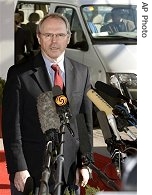2007年VOA标准英语-US Expects Progress at Next Round of Korea Nucl(在线收听)
State Department
01 February 2007
The chief U.S. delegate to the six-party talks on North Korea's nuclear program says there are reasons to expect progress at the next round, which begins in Beijing February 8. Assistant Secretary of State for East Asian Affairs Christopher Hill says he hopes the talks will produce agreement on a first phase of steps leading to a denuclearized Korean peninsula. VOA's David Gollust reports from the State Department.
North Korea refused to even discuss disarmament at the last round of talks in Beijing in December, demanding instead that the United States lift sanctions in imposed on Pyongyang in 2005 for alleged illicit financial activity.
However, Assistant Secretary Hill held bilateral talks with his North Korean counterpart Kim Kye-Gwan two weeks ago in Berlin, and U.S. Treasury officials have just completed what were termed "useful" meetings on the financial issues with a North Korean team in Beijing.
In a talk with reporters here, Hill said he was not prepared to declare outright that North Korea has changed its approach with regard to the talks. But he nonetheless made clear he is going into the new round with an expectation of progress on the core nuclear issue.
 |
| Christopher Hill |
Hill said the aim of the upcoming round is to make a "substantial start" on implementing the agreement in principle the six parties made in September of 2005.
Under that framework, North Korea said it was prepared to end its nuclear program in exchange for aid and security guarantees from the other parties, which include South Korea, Japan and Russia as well as North Korea, the United States and host China.
The U.S. envoy would not specify what the initial phase, or as he put it, the first "tranche," of a disarmament deal might include. But he did not dispute a recent comment by U.S. intelligence chief John Negroponte that a freeze in the North Korean nuclear program was one objective.
Under questioning, Hill dismissed suggestions that political pressure on North Korea to give up nuclear weapons might dissipate if it merely agreed to a first phase of measures.
He said one advantage of the six party format, as opposed to the bilateral approach pursued with Pyongyang in the 1990's by the Clinton administration, is that North Korea is also subject to leverage by its main allies and trading partners.
"I think the overall architecture of this, of six different countries involving some of the most important countries of the world," he added. "Japan is the second-largest economy in the world, the United States is the first largest, China is an enormous player, Russia is an enormous energy player for example. I mean these are big players, and so by getting everyone together, I think we do have a reason to believe we can get beyond the initial tranche."
Hill said the U.S. Treasury team had "good discussions" with the North Koreans over the financial issues this week in Beijing, but did not elaborate.
The Treasury Department in late 2005 imposed sanctions on a Macao-based Chinese bank it said had been used as a hub by North Korea for passing counterfeit U.S. banknote and other illicit activity.
The U.S. envoy will visit Seoul and Tokyo for consultations before arriving in Beijing next Wednesday on the eve of the new round of nuclear talks. He said he expects to have separate meetings with the North Koreans on the sidelines of the talks, which he indicated would last three or four days.